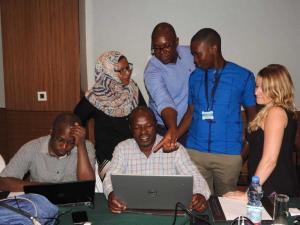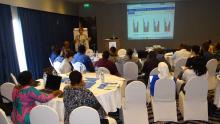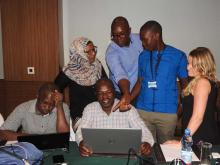From data to decision-making for health
15-17 January 2019, Dar es Salaam: Strong health information systems are the foundation of informed decision-making for health. Countries require reliable data for planning and management of health services and for monitoring progress toward the Sustainable Development Goals, including universal health coverage. Health data is obtained from various sources including population-based surveys, civil registration systems, health facility surveys and routine facility data systems (also known as health management information systems or HMIS).
Despite substantial investments, many countries continue to face multiple challenges related to routine health facility data, including poor data quality, fragmented data management systems, inadequate standard operating procedures and limited capacity for analysis and use of data at district and facility levels. Furthermore, the data management systems utilized by programmes such as Malaria, HIV, TB and Immunization, are frequently neither integrated into a comprehensive facility data system nor coordinated with other programmes.
In an effort to support countries in addressing some of these challenges WHO, together with the University of Oslo, Global Fund, GAVI, UNICEF and other Health Data Collaborative partners, is working on an integrated, standards-based approach for strengthening health facility data quality, analysis and use. The objectives of this approach are:
1. To address critical gaps and needs for improving analysis and use of data for action, based on international health service delivery and programmatic standards;
2. To promote and strengthen integrated and/or interoperable approaches wherever possible and to better align investments in facility data systems toward scale-able and sustainable systems;
3. To promote and strengthen a global, regional and national network of technical expertise in facility data through capacity building programmes that include ministries of health, national institutes, academia and other stakeholders.
In this context, a workshop was convened to engage a broad group of national stakeholders in identifying key routine facility data challenges and defining priorities for investment and action toward strengthening the national routine facility data system, using an integrated, standards-based approach. Workshop objectives included:
1. Introduce the toolkit for strengthening routine facility data systems using an integrated, standards-based approach and demonstrate use of the DHIS2 Health Apps to support its implementation;
2. Discuss and validate the results of the self-assessment exercise on national routine facility data systems with a broad group of national stakeholders;
3. Build consensus around key challenges and priorities for strengthening the routine facility data system using an integrated, standards-based approach;
4. Facilitate discussion on an action plan for addressing the defined priorities;
5. Highlight opportunities for collaboration and harmonization among technical programmes, data focal points and monitoring and evaluation focal points, as well as external stakeholders.
The workshop resulted in increased knowledge among participants on harmonized approaches, standards and best practices for strengthening the analysis and use of routine facility-based data. Participating programmes were also able to identify common key challenges and priorities for strengthening facility data systems. As a next step, programmes are expected to incorporate WHO standard data analysis packages, develop health facility dashboards to guide facility and district decision making and cascading the training to regional and district councils. The adoption and use of WHO standard data analysis packages will help the health sector to have integrated and harmonized methods across the programmes in data use.






